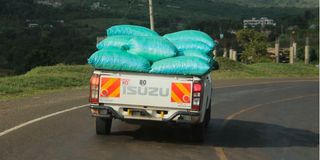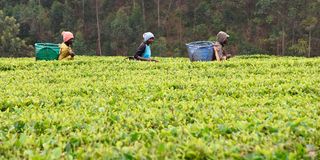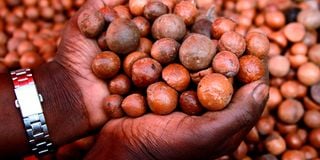
A farmer Evageline Wabeti drying Coffee Mbuni at Kabati in Muranga County.
After toiling on their farms and incurring huge financial costs to nurture their crops, wayward figures lurking in the dark pounce and steal their mature produce. They strike in the dead of the night, leaving the farmer stuck in servitude.
If the farmer survives crop thieves, the middlemen, commonly known as ‘brokers’, come for the little that is left. The end result is raw, endless pain.
“That is the reason why I am asking the Central Region Security Committee to publish a timeframe and a plan on how to deal with crop thefts. It is no longer a laughing matter since farmers are losing more than 40 per cent of their produce to thieves,” said Murang’a Senator Joe Nyutu in an interview.

A pickup truck ferries macadamia nuts along Murang'a - Sagana road on March 29, 2024.
He adds that the issue is a potential security threat since farmers have started ganging up and lynching thieves.
At least 12 suspects have been lynched in the past three months.
Mr Nyutu says that the stolen produce is sold to brokers who offer a ready market. And the vicious cycle continues.
“The brokers knowing too well that the thieves will sell their loot at throwaway prices will readily buy the stolen crop and make a killing,” he said.
Avocados, macadamia nuts, sugarcane, cassava, sweet potatoes, arrowroots and vegetables are the major targets. In extreme cases, the thieves also milk dairy cows, harvest tea and coffee under the cover of darkness.
Murang’a crop director Mr John Muchiri says the farmers’ situation is agonising, adding that despite having laws and by-laws to structure area markets, they have never been implemented.

Workers picking tea leaves at a fam in Gatanga, Muranga County.
“Brokers use faulty weighing scales and even steal items that have to be counted. The elderly and the illiterate farmers suffer the most,” Central Region Fresh Farm Produce Association chairman Josephat Munyiri said.
He said that there is very little difference between most village brokers and thieves.
Former Mt Kenya MCAs Caucus chairman Charles Mwangi said the only way out is for governors to structure county markets.
“We should do away with these mobile buyers who roam the villages to buy farm produce. We should have central points where farmers pool their produce and engage with buyers. That way, we will eradicate illegal markets that can be seen all over our villages,” he said.
Mr Mwangi county governments should liaise with the Agricultural Food Authority (AFA) to eradicate illegal markets and curb the theft of immature farm produce to sell to brokers.
Nakuru Woman Representative Liza Chelule said the government cannot spend a fortune to provide subsidies for farmers and then leave them at the mercy of thieves and brokers.
“If we ensured that the cost of production is low, there is water for irrigation and there are no thieves and exploitative brokers. And if we ensured that farmers join groups, markets are structured and the playing field is even, then we will know that we are putting money in our farmers’ pockets,” said Ms Chelule.

Farmer holds a macadamia nuts harvest.
The Senate Agriculture Committee chairman Kamau Murango said the future of the agricultural sector lies in the country’s ability to establish proper market infrastructure devoid of greed-driven elements such as brokers.
“Farmers must join groups and have bulk market access points. Buyers must be known by name and their physical addresses. No crop harvests should be done outside specified cycles. Police at roadblocks should be helping farmers to arrest people who cannot account for the produce they are transporting,” said Mr Murango.
Mr Nyutu said a classic case of market distortion can be found in Murang’a where avocado processors pay millions of shillings as annual dividends.
“But the truth of the matter is that brokers buy off avocados at low prices from farmers and deliver them to the processors. These brokers who deliver the produce to the processors or the exporters are the ones who are paid dividends, not the farmer,” he said.
So serious is the issue that Nominated Senator Veronicah Maina told President William Ruto at Kangari market on July 21 last year to help all stakeholders come together and streamline the value chain that unfairly gives the broker the upper hand.












